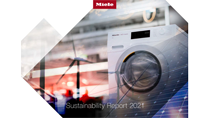Press releases
Miele Professional – The Milestones

Miele Professional – The Milestones
1924
It all started with the first drum washing machines for commercial use, heated with gas or coal. Target groups are laundry facilities, hotels, hospitals and sanatoriums.
1961
Entry into the medical technology segment with special washing devices for surgical instruments and laboratory glassware, as well as the first dishwashers for cafes and restaurants. The products are manufactured in the Bielefeld plant.
1962
The first Miele plant outside of Germany is founded in Bürmoos near Salzburg. After initially primarily manufacturing compact washing machines, spin dryers and lightweight irons, today the plant provides approximately 1,000 application-specific stainless steel baskets and inserts for automatic cleaning and disinfection devices.
1965
After acquiring the former Gillette plant in Lehrte near Hannover, devices for commercial laundry care are manufactured there. Ever since, Lehrte has been providing the complete spectrum of larger commercial washing machines, dryers and rotary irons.
1971
For hospitals, now there are "special automatic dishwashers" with special flexible punch-card control for anesthesia, HNO, gynecology and other medical specialties.
1977
The "Little Giants" for use in small commercial enterprises start a success story that continues today. The outstanding characteristics of these household washing machines and dryers are compact design and particularly robust professional technology.
1979
For the first time, the G 7717 automatic disinfection device enables separation with a clean side and a non-clean side.
1986
Miele acquires rotary iron manufacturer Cordes in Oelde – where today primarily ovens are produced; production of rotary irons has been transferred to Lehrte.
1989
Miele launches a spin dryer on the market with a clean side and a non-clean side, which cleans disinfection laundry as stipulated in the strict directives of the "Laundry Facility" directive and is optimal for hospitals and care facilities.
1991
Together with textile chemicals specialist Kreussler, Miele develops the WetCare wet cleaning process. An eco-friendly alternative to chemical cleaning, with which even textiles that were previously marked "Do Not Wash" can be washed and dried with no problems.
1994
In the medical segment Miele develops Vario TD a new cleaning and disinfection program, which to this day is the market standard. It replaces the previous so-called "BGA* Seuchen" program as routine program. *BGA = Bundesgesundheitsamt [German Federal Health Office] (today the Robert-Koch-Institute).
1995
The first generation of high-capacity disinfectors is equipped with the freely programmable Profitronic electronic control system, which up to 64 programs can be individually created.
2004
Miele launches the Oxivario processing procedure on the market, which enables cleaning of medical instruments that the Robert-Koch-Institute classifies as critical. The procedure is later successfully tested with regard to effectiveness against prions (pathogens that cause Kreuzfeld-Jacob disease).
2010
Miele Professional becomes system provider for the planning, equipping and maintenance of the sterile service in medical practices, clinics and hospitals, for all processing stages including process chemicals as well as hardware and software solutions for data documentation.
2011
Introduction of Miele's own brand of consumables. Under the name of "ProCare" initially cleaning agents for processing of dental instruments are offered. Later additional cleaning agents and wash-up agents are offered for the processing of laboratory glassware, tableware, textiles and medical products.
With the RobotVario procedure the particularly complex instruments of robot-assisted surgery (da Vinci system) can be safely processed.
For the first time, Miele launches laundry dryers with heat pump on the market and thus significantly reduces energy consumption. Energy consumption is reduced up to 50% compared to exhaust air dryers.
2013
Introduction of the hot water dryer. These dryers can use hot water, for example as made available by an in-house co-generation plant or another power generator, as direct heat source. This reduces energy costs to a minimum.
2016
In collaboration with the Italian launderette chain Lava Più, Miele introduces a concept for the turnkey outfitting of launderettes. Lava Più has been a 100% Miele enterprise since 2022 and is expanding internationally under the "Bloomest" brand.
2017
Miele acquires Italian medical specialist Steelco Group and there bundles the entire hospital project business and introduces the innovative patented 4D sensor. Via the appropriate procedure, steam saturation can be measured – a prerequisite for safe sterilisation. In the professional network, Miele continuously contributes innovations for Steelco products, for example, also the PowerPulse cleaning system (2019).
2018
The patented EasyLoad loading system revolutionises loading and unloading of laboratory glassware washers. This task has never before been easier, faster or more convenient.
2019
The company appWash is founded. The company is a provider of digital system solutions for communal laundry facilities, e.g. in student dormitories.
The power pulse cleaning system enables effective cleaning/disinfection of microsurgery instruments that cannot be dismantled. Thus, the practice of manual precleaning, which is customary in the market, can be dispensed with.
2020
Restructuring of the Professional business unit as "company-in-company" where all functions from development to sales and service are bundled (more than 3,000 employees worldwide).
2021
Miele AirControl, the mobile air cleaner is produced in the Lehrte plant. It filters more than 99.995% of all viruses and other suspended particles out of the room air and renders them harmless.
With Miele MOVE the first online portal is available that enables the networking of laundry facility machines and mobile devices.
2022
At Medica in Düsseldorf Steelco presents M-ATS the autonomous transport robot developed through a cooperation with Miele, Steelco and Miele subsidiary Yujin Robot. The robot moves freely in the room and offloads AEMP (CSSD) personnel (Central Sterile Service) by automatically loading and unloading the cleaning and disinfection devices as well as sterilizers. The NCG (non-condensing-gases) sensor is a second innovation and an additional indicator for sustainable and effective sterilisation processes.
Miele acquires hygiene specialist SMP in Tübingen and offers validation, laboratory testing and provision of test specimens to all users and manufacturers of medical products.
2023
The new MasterLine generation of clean water dishwashers with excellent cleaning performance and a short runtime of just five minutes are placed on the market. They can also be networked with Miele MOVE and they have been awarded the Golden Virus Seal.
For expansion of its Medical Technology, Laboratory and Pharma Division in the Professional Business Unit, Miele and Swiss industry holding company Metall Zug, announce a joint venture. Miele desires to bring its Steelco Group into the JV, Metall Zug its two Belimed companies Infection Control and Life Science.
2024
After obtaining the consent of the responsible authorities the joint venture starts under the brand SteelcoBelimed. Together the enterprise is now one of the largest players in the worldwide market for hygiene solutions designed for clinics, hospitals, laboratories and the pharma industry.
Company profile: Miele is recognised as the world's leading supplier of Premium domestic appliances, with an inspiring portfolio for the kitchen, laundry and floor care. The company also offers machines, systems and services for use in hotels, offices, care and medical technology. Since its foundation in 1899, Miele has lived up to its brand promise of "Immer Besser" in terms of quality, innovation, performance and timeless elegance. With its durable and energy-saving appliances, Miele helps its customers to make their everyday lives as sustainable as possible. The company is still owned by the two founding families Miele and Zinkann and has 15 production plants, eight of which are in Germany. Around 22,700 people work for Miele worldwide and the company's most recent turnover was 4,96 billion Euro. The company has its headquarters in Gütersloh in Westphalia.
Download as PDF
Anke Schläger
+ 49 5241 89-1949
anke.schlaeger@miele.com


